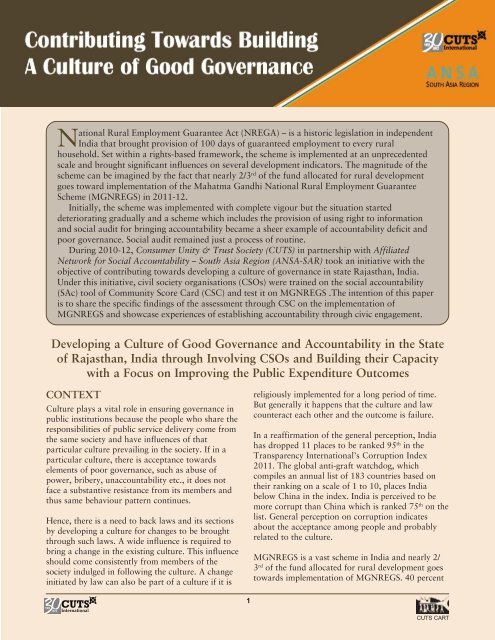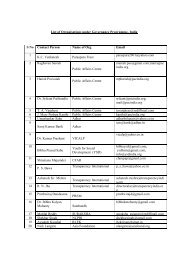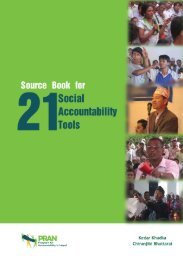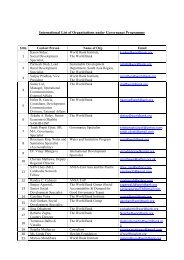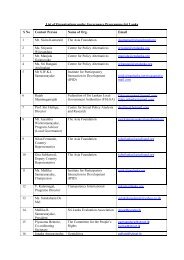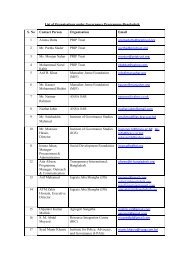Contributing towards building a culture of good governance - CoPSA
Contributing towards building a culture of good governance - CoPSA
Contributing towards building a culture of good governance - CoPSA
Create successful ePaper yourself
Turn your PDF publications into a flip-book with our unique Google optimized e-Paper software.
N<br />
ational Rural Employment Guarantee Act (NREGA) – is a historic legislation in independent<br />
India that brought provision <strong>of</strong> 100 days <strong>of</strong> guaranteed employment to every rural<br />
household. Set within a rights-based framework, the scheme is implemented at an unprecedented<br />
scale and brought significant influences on several development indicators. The magnitude <strong>of</strong> the<br />
scheme can be imagined by the fact that nearly 2/3 rd <strong>of</strong> the fund allocated for rural development<br />
goes toward implementation <strong>of</strong> the Mahatma Gandhi National Rural Employment Guarantee<br />
Scheme (MGNREGS) in 2011-12.<br />
Initially, the scheme was implemented with complete vigour but the situation started<br />
deteriorating gradually and a scheme which includes the provision <strong>of</strong> using right to information<br />
and social audit for bringing accountability became a sheer example <strong>of</strong> accountability deficit and<br />
poor <strong>governance</strong>. Social audit remained just a process <strong>of</strong> routine.<br />
During 2010-12, Consumer Unity & Trust Society (CUTS) in partnership with Affiliated<br />
Network for Social Accountability – South Asia Region (ANSA-SAR) took an initiative with the<br />
objective <strong>of</strong> contributing <strong>towards</strong> developing a <strong>culture</strong> <strong>of</strong> <strong>governance</strong> in state Rajasthan, India.<br />
Under this initiative, civil society organisations (CSOs) were trained on the social accountability<br />
(SAc) tool <strong>of</strong> Community Score Card (CSC) and test it on MGNREGS .The intention <strong>of</strong> this paper<br />
is to share the specific findings <strong>of</strong> the assessment through CSC on the implementation <strong>of</strong><br />
MGNREGS and showcase experiences <strong>of</strong> establishing accountability through civic engagement.<br />
Developing a Culture <strong>of</strong> Good Governance and Accountability in the State<br />
<strong>of</strong> Rajasthan, India through Involving CSOs and Building their Capacity<br />
with a Focus on Improving the Public Expenditure Outcomes<br />
CONTEXT<br />
Culture plays a vital role in ensuring <strong>governance</strong> in<br />
public institutions because the people who share the<br />
responsibilities <strong>of</strong> public service delivery come from<br />
the same society and have influences <strong>of</strong> that<br />
particular <strong>culture</strong> prevailing in the society. If in a<br />
particular <strong>culture</strong>, there is acceptance <strong>towards</strong><br />
elements <strong>of</strong> poor <strong>governance</strong>, such as abuse <strong>of</strong><br />
power, bribery, unaccountability etc., it does not<br />
face a substantive resistance from its members and<br />
thus same behaviour pattern continues.<br />
Hence, there is a need to back laws and its sections<br />
by developing a <strong>culture</strong> for changes to be brought<br />
through such laws. A wide influence is required to<br />
bring a change in the existing <strong>culture</strong>. This influence<br />
should come consistently from members <strong>of</strong> the<br />
society indulged in following the <strong>culture</strong>. A change<br />
initiated by law can also be part <strong>of</strong> a <strong>culture</strong> if it is<br />
religiously implemented for a long period <strong>of</strong> time.<br />
But generally it happens that the <strong>culture</strong> and law<br />
counteract each other and the outcome is failure.<br />
In a reaffirmation <strong>of</strong> the general perception, India<br />
has dropped 11 places to be ranked 95 th in the<br />
Transparency International’s Corruption Index<br />
2011. The global anti-graft watchdog, which<br />
compiles an annual list <strong>of</strong> 183 countries based on<br />
their ranking on a scale <strong>of</strong> 1 to 10, places India<br />
below China in the index. India is perceived to be<br />
more corrupt than China which is ranked 75 th on the<br />
list. General perception on corruption indicates<br />
about the acceptance among people and probably<br />
related to the <strong>culture</strong>.<br />
MGNREGS is a vast scheme in India and nearly 2/<br />
3 rd <strong>of</strong> the fund allocated for rural development goes<br />
<strong>towards</strong> implementation <strong>of</strong> MGNREGS. 40 percent<br />
1<br />
CUTS CART
<strong>of</strong> households accessing MGNREGS fall within the<br />
low-income group and 42 percent fall within the<br />
middle-income group. This indicates the spread <strong>of</strong><br />
this scheme among rural poor and marginalised.<br />
To develop a <strong>culture</strong> among service recipients to<br />
demand proper delivery <strong>of</strong> services, there is a vital<br />
need <strong>of</strong> <strong>building</strong> client power, strengthen the<br />
demand side <strong>of</strong> service delivery and sustain it to have<br />
consistent influence on the existing <strong>culture</strong>.<br />
CUTS’ INTERVENTION<br />
CUTS in partnership with ‘Affiliated Network for<br />
Social Accountability in South Asia Region (ANSA-<br />
SAR) took an initiative and implemented a project<br />
entitled ‘Developing a Culture <strong>of</strong> Good Governance<br />
and Accountability in the State <strong>of</strong> Rajasthan, India<br />
through Involving CSOs and Building their Capacity<br />
with a Focus on Improving the Public Expenditure<br />
Outcomes’ during 2010-2012.<br />
The project attempts to build the intermediary<br />
agencies having understanding <strong>of</strong> issues related to<br />
<strong>governance</strong> and SAc approaches. It envisages<br />
<strong>building</strong> a cadre <strong>of</strong> people equipped with resources<br />
required for applying their understanding for<br />
improving the service delivery provided by the local<br />
government. These intermediary agencies rigorously<br />
trained in using CSC – a SAc tool to engage service<br />
recipients and providers for improving services –<br />
jointly at a local level will test their learnings for<br />
improving the implementation <strong>of</strong> MGNREGS in<br />
their locality and also form a network to share their<br />
experiences during usage <strong>of</strong> tools.<br />
Since the CSC tool is effective at lower level <strong>of</strong><br />
service delivery and very effective in engaging service<br />
providers as well as recipients, it was envisaged that<br />
the people once trained on CSC will further utilise it<br />
in various programmes and schemes in order to<br />
improve the service delivery. The government will<br />
also be advocated on the effectiveness <strong>of</strong> the tool<br />
and for providing space to introduce this<br />
accountability mechanism by CSOs.<br />
Implementation Plan<br />
A cadre <strong>of</strong> people from community-based<br />
organisations (CBOs), which are concerned about<br />
the poor <strong>governance</strong> and lack <strong>of</strong> accountability,<br />
were identified through a screening process having<br />
indicators <strong>of</strong> credibility, previous work done etc.<br />
Capacity gap analysis was done to screen and<br />
grading based on the understanding, relevant<br />
knowledge, information available etc. These people<br />
were given rigorous training with practical<br />
application <strong>of</strong> CSC.<br />
Selected representatives <strong>of</strong> CSOs were given training<br />
on the CSC process. A state level training <strong>of</strong> master<br />
trainers, four divisional level trainings and two<br />
refresher courses were conducted by CUTS. The<br />
training workshops were organised during October<br />
2010-March 2011 in various parts <strong>of</strong> Rajasthan<br />
covering all divisions. The trainings resulted in<br />
getting 13 master trainers and 66 facilitators on<br />
CSC. This cadre <strong>of</strong> the trained people, as partner<br />
organisations, executed CSC process in the<br />
MGNREGS in 66 gram panchayats <strong>of</strong> Rajasthan. All<br />
33 districts were covered under this project.<br />
Status <strong>of</strong> MGNREGS<br />
Data gathered from secondary sources (http://<br />
nrega.raj.nic.in/), presents a clear picture about the<br />
quantitative aspect <strong>of</strong> MGNREGS implementation in<br />
Rajasthan. There is steep decline in the<br />
implementation <strong>of</strong> NREGS in Rajasthan. The state<br />
could provide only 38 person days <strong>of</strong> employment<br />
S. No. Items 2008-09 2009-10 2010-11 2011-12<br />
1 Family with job cards (in lakh) 84.68 89.28 92.74 95.64<br />
2 No. <strong>of</strong> families given work (in lakh) 63.69 65.22 58.24 47.84<br />
3 Total person days created (in lakh) 4829.38 4498.08 3026.65 1867.72<br />
4 No. <strong>of</strong> families completing 100 days (in lakh) 25.94 17.63 5 1.37<br />
5 Average employment days (per family) 76 69 52 38<br />
6 Total expenditure (in crores) 6175.55 5669.05 3300.33 2757.64<br />
7 Average wage rate per person days 89 87 75 94<br />
8 Average expenditure per person days 128 126 108 148<br />
2<br />
CUTS CART
Community Score Card (CSC)<br />
CSC is a qualitative monitoring tool that is used for local level monitoring and performance evaluation <strong>of</strong><br />
services, projects and even government administrative units by communities themselves. It is a hybrid<br />
process including the techniques <strong>of</strong> social audit, community monitoring and citizen report cards and act<br />
as an instrument to exact social and public accountability and responsiveness from service providers.<br />
However, by including an interface meeting between service providers and the community that allows<br />
for gathering immediate feedback, the process becomes a strong instrument for empowerment. The CSC<br />
process uses the “community” as its unit <strong>of</strong> analysis, and is focused on monitoring at the local/facility<br />
level. It can, therefore, facilitate the monitoring and performance evaluation <strong>of</strong> services, projects and even<br />
government administrative units (like district assemblies) by the community themselves. Since it is a<br />
grassroots process, it is also more likely to be <strong>of</strong> use in a rural setting.<br />
per family in in in FY 2011-12 in comparison to 76<br />
person days FY 2008-09. The number <strong>of</strong> families<br />
given job under the scheme has gone down from<br />
M63.69 lakh in 2008-09 to 47.84 lakh in 2010-11.<br />
The total expenditure in NREGS has also drastically<br />
gone down from M6175.55 crores in 2008-09 to<br />
M3300.33 crores in 2010-11.<br />
KEY FINDINGS OF CSC<br />
Issues related to Application for Jobs<br />
Basic development needs are being recognised as<br />
rights gradually. The National Rural Employment<br />
Guarantee Act (NREGA), The Right to Information<br />
Act, The Right to Education Act or the Food<br />
Security Act etc. are examples <strong>of</strong> the shift in policy<br />
corridors <strong>towards</strong> recognising and realising needs as<br />
rights <strong>of</strong> the people.<br />
Wage seekers have the right to apply for jobs and<br />
are entitled to receive it within the specified period<br />
<strong>of</strong> time. This right to demand employment as and<br />
when needed is acknowledged through a dated<br />
receipt issued by the Gram Panchayat and an<br />
unemployment allowance to the job card holder who<br />
has demanded employment, in case <strong>of</strong> delay in<br />
employment allocation, to be paid by the respective<br />
state governments.<br />
Status on ground<br />
Application forms are not easily available in most <strong>of</strong><br />
gram panchayats. Job application is not accepted<br />
orally as earlier. So an illiterate person requiring jobs<br />
under MGNREGS may need to visit the photo-copy<br />
shop and pay for services <strong>of</strong> making the application<br />
form available and filling it. Even after availing this<br />
paid service, applicants do not get the dated receipt<br />
for submitted application. Since the unemployment<br />
allowances have to be provided by the state<br />
government by NREGA guidelines, the government<br />
<strong>of</strong>ficials are discouraged to leave any scope for<br />
unemployment allowances.<br />
Wage Less than the Minimum Official Wage<br />
Minimum wages are the lowest possible wage at<br />
which a workman can be employed by any employer<br />
– private or public. The right to minimum wages has<br />
been recognised as a fundamental right by the<br />
Supreme Court <strong>of</strong> India, which has held nonpayment<br />
<strong>of</strong> minimum wages to be a violation <strong>of</strong><br />
Article 23 and therefore declared it to be “forced<br />
labour.”<br />
Status on ground<br />
There is severe shortage <strong>of</strong> jobs under the scheme<br />
due to negligence from the side <strong>of</strong> implementing<br />
agency. The reason behind this negligence is that<br />
benefit is not proportionate to the effort need to be<br />
made for implementing the scheme by front line<br />
service providers. The existence <strong>of</strong> certain<br />
accountability measures in the scheme is also one<br />
reason.<br />
Due to shortage <strong>of</strong> work, wage seekers are not able<br />
to get enough supply for their demand <strong>of</strong> jobs. This<br />
leads a sort <strong>of</strong> competition among the job seekers<br />
and nobody, especially poor and marginalised who<br />
really are in need <strong>of</strong> jobs dare to go against the<br />
government <strong>of</strong>ficials.<br />
Labourers are divided in the group <strong>of</strong> five for<br />
execution <strong>of</strong> MGNREGS work and daily<br />
measurement has to be done by mate and to be<br />
noted on a prescribed sheet <strong>of</strong> paper which should<br />
remain with labourers. For formation <strong>of</strong> the group,<br />
wage seekers need to apply in group <strong>of</strong> five. Wage<br />
seekers apply in group <strong>of</strong> their choice, but when the<br />
final list comes after processing, they do not get the<br />
3<br />
CUTS CART
Case Study – Bheem Nagar, Bhilwara<br />
Job Guarantee Scheme, a legal entitlement behaves differently and discriminates its various stakeholders<br />
undesirably. For some it is a means for their livelihood, and for some it is only means to address their<br />
hunger. However, some takes it as a means for making little extra income; some takes it simply as an<br />
additional workload and some as a headache.<br />
Bheem Nagar village <strong>of</strong> Bhilwara district <strong>of</strong> Rajasthan, 250 kms away from Jaipur, turns into an island<br />
during rainy season and prevents the possibility <strong>of</strong> livelihood outside the village. This is a village where<br />
majority <strong>of</strong> the people belong to Bheel and Meena communities which come under Schedule Tribes.<br />
People are either landless or with a meagre land inadequate to sustain one family even. In adverse climate<br />
<strong>of</strong> Rajasthan where water level has gone extremely down and agri<strong>culture</strong> is dependent on rain water<br />
especially in case <strong>of</strong> marginalised farmers, Job Guarantee Scheme has been a ray <strong>of</strong> hope in case <strong>of</strong> no<br />
rain or otherwise also. The people belonging to such marginalised communities are mostly at the<br />
receiving end <strong>of</strong> society and ‘Demand’ word is not in the vocabulary. They are afraid <strong>of</strong> the awful<br />
consequences <strong>of</strong> making any demand in terms <strong>of</strong> further not getting jobs or any such benefits coming<br />
from the government.<br />
Job guarantee work was also not being performed in Bheem Nagar for two years. The sanction register<br />
<strong>of</strong> Dhikola Gram Panchayat tells that a work sanctioned on March 28, 2008 could fetch fund only on<br />
May 28, 2010 for construction <strong>of</strong> Gravel road from Bheem Nagar to Badesara.<br />
During October 2011, facilitators <strong>of</strong> Saraswati Bal Sewa Samiti, a local NGO, trained under this<br />
intervention, conducted CSC to assess services provided under Gravel road construction work. In the<br />
input tracking, it was found that out <strong>of</strong> approved M7.84 lakh for wage, only M2.41 lakh had been spent,<br />
only 26 job card holders have been provided job out <strong>of</strong> 181 job card holders.<br />
In the process <strong>of</strong> community generated score card, community members were happy that the work could<br />
be started after a long time and they could get jobs. But they were not happy with the time taken for<br />
delivery <strong>of</strong> payment, which was 2-3 months. They also complained that the payment is made at Gram<br />
Panchayat several times in the night.<br />
The community put very low score on the indicator <strong>of</strong> facilities like first aid, shade (tent) and drinking<br />
water. They demanded that the means <strong>of</strong> measurement should be given to them so that they can measure<br />
the individual work done on a daily basis. During the process <strong>of</strong> self-evaluation, the service providers<br />
showed some sensitivity <strong>towards</strong> low wage for labourers in the scheme and scored low for themselves.<br />
Interface meetings provided an opportunity to discuss problems encountered by service recipients and<br />
providers. The action plan emerged with a fix responsibility and time period.<br />
After the CSC, the shift is noticed in behaviour <strong>of</strong> the service provider. The Sarpanch has started<br />
interacting with beneficiaries and taking steps to solve the emerging problems on a regular basis. The<br />
people are provided with the measurement tape etc., to measure and note down the daily work. Drinking<br />
water and tent are made available at the worksite. The Adult Nurse Midwife (ANM) have also started<br />
visiting the worksites regularly and providing the necessary medical aid. The wage has gone up from M19<br />
to M88 and payment is also made on time now in a school which is closer to the village.<br />
There is a hope that service providers will continue resolving the problems <strong>of</strong> implementation. The<br />
trained facilitators will also continue implementing the tool <strong>of</strong> social accountability in the direction <strong>of</strong><br />
developing a responsible world.<br />
4<br />
CUTS CART
group <strong>of</strong> their choice. They are informed that this<br />
has happened due to computer and nothing can be<br />
done in this regard.<br />
The group which is finally listed on the muster roll,<br />
many times it includes the name <strong>of</strong> old, disabled, or<br />
the people <strong>of</strong> higher caste who either is not able to<br />
perform their task or do not perform deliberately.<br />
Secondly, however this group exists on paper, in<br />
reality the group work concept is not in practice and<br />
measurement is done on collective basis.<br />
Measurement is done properly. In some cases, junior<br />
technical assistant does the measurement even<br />
without visiting the worksite and blames about<br />
severe workload on them.<br />
However, the MGNREGS guidelines allow the<br />
reduced task in case <strong>of</strong> digging the hard soil, but it<br />
was not being considered in some cases.<br />
Due to wages lower than minimum wage and delay<br />
in payments, the real wage seekers are forced to<br />
travel to the city and work in mines etc. and get<br />
exploited.<br />
Delay in Wage Payment<br />
The NREGA focuses on labourers’ rights to get<br />
employment, minimum wages and timely payments.<br />
To deliver payment on time, minimise the<br />
embezzlement and for financial inclusion <strong>of</strong> rural<br />
mass, it was decided that MGNREGA wages would<br />
be paid through banks and post <strong>of</strong>fices.<br />
Wage payment process involves several steps. Once<br />
the work is complete, muster roll for the work is<br />
submitted to the implementing agency. Then<br />
measurement <strong>of</strong> work is done and on the basis <strong>of</strong><br />
work done and attendance, a payment order listing<br />
labourers and wages is issued by the appropriate<br />
authorities. Then, the cheques and payment orders<br />
are sent to the bank or post <strong>of</strong>fice so that wages can<br />
be credited into the accounts <strong>of</strong> individual labourers.<br />
As per a circular issued by the Department <strong>of</strong> Rural<br />
Development dated November 30, 2011, penalty<br />
would be imposed on responsible <strong>of</strong>ficials for<br />
delayed payments in MGNREGS.<br />
Status on ground<br />
Across the State <strong>of</strong> Rajasthan, serious delays in the<br />
payment <strong>of</strong> NREGA have been witnessed. Apart<br />
from violating the law (the Act stipulates that wages<br />
be paid within 15 days <strong>of</strong> work being done), delays<br />
cause great hardship to NREGA labourers. When<br />
wages are delayed, they are forced to resort to lowerpaid<br />
or exploitative employment, and even distress<br />
migration. The delays cause reducing interest <strong>of</strong><br />
labourers in employment provided under the Act.<br />
Now the administration plays blame game on banks<br />
and post <strong>of</strong>fices for delays. Government <strong>of</strong>ficials<br />
<strong>of</strong>ten claim that they do their work in a timely<br />
manner but banks and post <strong>of</strong>fices are unable to<br />
cope with the volume <strong>of</strong> payments.<br />
However, in rural banks and post <strong>of</strong>fices, where<br />
number <strong>of</strong> employees is less, it is difficult to process<br />
payments in quick manner, but it is also true that<br />
these employees are not adequately sensitised and<br />
generally create problems deliberately for the<br />
MGNREGS labourers. They do not understand that<br />
their bank and post <strong>of</strong>fices are getting huge pr<strong>of</strong>it<br />
out <strong>of</strong> interest due to the scheme. In one case, it was<br />
found that the <strong>of</strong>ficial asks all family members at the<br />
bank to sign the withdrawal before releasing the was<br />
money as this a joint account. In another case, a one<br />
man run cooperative bank generally do not open the<br />
bank every working day.<br />
Delay in payment is also caused due to lack <strong>of</strong><br />
motivation among service providers to speed up the<br />
process <strong>of</strong> implementation as embezzlements in<br />
MGNREGS have become difficult. Even if the<br />
implementing agency expand measurements and fill<br />
fake names in the muster roll, they need to collude<br />
with the labourers/job card holders in order to<br />
embezzle the fund as the money goes directly in to<br />
the accounts <strong>of</strong> the labourers.<br />
100 days’ Work to Every Rural Household<br />
NREGA is different from previous employment<br />
guarantee programmes in that it legally binds the<br />
government to provide employment for up to 100<br />
days a year to those who demand it. The worker<br />
may apply at any time <strong>of</strong> the year for any number <strong>of</strong><br />
days up to the guaranteed employment <strong>of</strong> 100 days<br />
in a year.<br />
Any loss in employment days after the demand made<br />
by job seeker is serious in case <strong>of</strong> NREGA and<br />
financial loss to the individual household.<br />
Rajasthan ranked first for NREGA implementation<br />
by the Minister <strong>of</strong> Rural Development during 2007-<br />
08 but the situation is worsening gradually.<br />
5<br />
CUTS CART
Status on ground<br />
As mentioned earlier, implementing agencies are<br />
showing ignorance in the implementation <strong>of</strong><br />
MGNREGS as the money goes to the account<br />
directly. Secondly, the village panchayat (Gram<br />
Panchayat) have exhausted most <strong>of</strong> the kuchcha<br />
work and generally find it difficult to propose work<br />
under the criteria given to them.<br />
Even after repetitive requests and applying for work<br />
for complete 100 days, many families are not getting<br />
jobs. A Gram Panchayat consists <strong>of</strong> five-six villages<br />
and job card holders <strong>of</strong> one particular Gram<br />
Panchayat can get jobs in any <strong>of</strong> these villages. In<br />
some cases, it was found that labourers from one<br />
village experiences protest when they are given jobs<br />
in other villages as the villagers <strong>of</strong> the village, where<br />
work is going on, are not given work as per their<br />
demand. This happens because <strong>of</strong> the shortage <strong>of</strong><br />
jobs in the Gram Panchayat.<br />
Most <strong>of</strong> the labourers are women. They need to<br />
complete their household chores before moving to<br />
the worksite. Since Rajasthan is geographically wide<br />
and villages are situated at distance, it becomes<br />
difficult for women to complete their household<br />
chores, work under NREGS, return their home and<br />
then again complete their evening work and thus<br />
they are not able to travel long.<br />
People are gradually losing their interest due to<br />
several reasons. People do not have ownership<br />
among work done due to no consultation with<br />
Gram Sabha members during proposal making.<br />
Proposals are formulated based on political<br />
influences made by elected representatives without<br />
consulting villagers.<br />
Worksite Management<br />
Proper worksite management can ensure <strong>good</strong><br />
working condition, mandatory worksite facilities,<br />
regular measurement <strong>of</strong> work, implementation <strong>of</strong><br />
transparency safeguards, technical supervision for<br />
adequate labour productivity and asset creation.<br />
This all depends on the frontline service providers<br />
who execute the processes <strong>of</strong> NREGS.<br />
Status on ground<br />
Other than the drinking water facilities and first aid<br />
box, in most cases, the facilities <strong>of</strong> shade and crèche<br />
had been reported to be absent at the worksites.<br />
Water was also not adequately available at many<br />
worksites. It was informed that the main problem<br />
behind making these facilities available is to carry<br />
them to the worksite.<br />
In most places <strong>of</strong> Rajasthan, water is a scarce<br />
commodity and not available everywhere. To fulfil<br />
the need <strong>of</strong> water for a group <strong>of</strong> 40 labourers (one<br />
person is assigned for making water available to 40<br />
labourers) huge quantity <strong>of</strong> water is required<br />
especially in summer season but to carry that to the<br />
worksite no allocation is made. The tent and crèche<br />
given to the Gram Panchayat can also not be carried<br />
out by a single person.<br />
The behaviour <strong>of</strong> service providers (Mate, Gram<br />
Panchayat <strong>of</strong>ficials, Bank and post <strong>of</strong>fice service<br />
providers) are also sometimes discriminating. The<br />
caste, power and other factors determine their<br />
behaviour. The people <strong>of</strong> higher cost generally do<br />
not work at the worksite. The measurement for the<br />
work is done on collective basis which results in<br />
exploitation <strong>of</strong> the real wage seekers, and thus loss<br />
<strong>of</strong> faith in MGNREGS.<br />
The measurement <strong>of</strong> work done is critical to the<br />
wage payment to labourers and that should be on<br />
time in order to release payment on time. Many a<br />
times, there is huge workload on technical assistants<br />
and engineers. This gives them excuse to do the<br />
measurement without visiting the worksite. In some<br />
cases, they also inflates the measurement in order to<br />
enhance the wage rate and this further hamper<br />
creation <strong>of</strong> assets for the livelihood generation as per<br />
the objectives <strong>of</strong> MGNREGS.<br />
The Frequencies <strong>of</strong> Issues in CSC Exercise<br />
Under the project, the CSCs were conducted in 66<br />
gram panchayats <strong>of</strong> 33 districts <strong>of</strong> Rajasthan. Several<br />
issues with regard to the implementation <strong>of</strong> scheme<br />
came out with these exercises. When it was found<br />
Frequency (%) <strong>of</strong> issues emerged in CSCs<br />
90<br />
80<br />
70<br />
60<br />
50<br />
40<br />
30<br />
20<br />
10<br />
0<br />
24<br />
19<br />
63<br />
79<br />
22<br />
60<br />
35<br />
21<br />
29<br />
35<br />
6<br />
CUTS CART
that some issues are coming in higher frequency, it<br />
was decided to see the comparative frequencies <strong>of</strong><br />
these issues (see the comparative chart).<br />
Recommendations<br />
Dissemination <strong>of</strong> information and awareness<br />
generation are required in case <strong>of</strong> MGNREGS as<br />
changes are regularly made in the process by the<br />
department. The front level service providers, who<br />
are in direct contact with beneficiaries, do not create<br />
awareness on the changed rules and guidelines or<br />
provide information to an extent which is beneficial<br />
for them. This leads <strong>towards</strong> various problems.<br />
Hence, there is a need to disseminate changes made<br />
in the process <strong>of</strong> MGNREGS regularly among<br />
employment seekers and maintain transparency.<br />
Thus, more money needs to be allocated every year<br />
for awareness generation.<br />
Building capacity <strong>of</strong> Panchayati Raj Institutions<br />
(PRIs) and other institutional agencies is the utmost<br />
need under MGNREGS. The infrastructure, both<br />
physical and human resource, <strong>of</strong> the Gram<br />
Panchayat needs to be strengthened. Similarly, other<br />
institutional agencies need to be oriented <strong>towards</strong><br />
the administrative requirements <strong>of</strong> a demand-based<br />
law.<br />
Given the limitations <strong>of</strong> workers’ formal skills and<br />
informal bargaining capacities, there is a need to<br />
create the feeling <strong>of</strong> right to employment among the<br />
people through MGNREGS and get<br />
acknowledgement <strong>of</strong> their application through dated<br />
receipts. The ability to formally articulate demands<br />
and participate in informed Gram Sabhas is possible<br />
only through development <strong>of</strong> client power through<br />
awareness and functional literacy among workers.<br />
CSC is a tool <strong>of</strong> high potential to develop a mutually<br />
agreed action plan to improve the process <strong>of</strong><br />
implementation <strong>of</strong> any service. Hence, it can be<br />
considered for mainstreaming with the active<br />
involvement <strong>of</strong> CBOs.<br />
The entire process <strong>of</strong> MGNREGS should be<br />
streamlined, i.e. from job application to wage<br />
payment to regain the reducing faith <strong>of</strong> employment<br />
seekers (100 days <strong>of</strong> employment with minimum<br />
<strong>of</strong>ficial wage). A detailed review must be carried out<br />
<strong>of</strong> the procedures being followed at the Gram<br />
Panchayat level to record the work under the<br />
MGNREGS on the <strong>of</strong>ficial website.<br />
Better coordination <strong>of</strong> beneficiaries with bank/post<br />
<strong>of</strong>fices should be ensured through sensitisation <strong>of</strong><br />
staffs. Banks/post <strong>of</strong>fices should also get prepared to<br />
reach out to the beneficiaries for payment.<br />
Justice denied when differently abled people/senior<br />
citizens’ work in the same group and collective<br />
measurement is done. They should be given work in<br />
line with their abilities. For old and disabled, the<br />
task can be reduced.<br />
Gram panchayats are facing scarcity in new kuchha<br />
work. There is a need to bring work related to<br />
livelihood generation for long under the purview <strong>of</strong><br />
MGNREGS especially the work which can reduce<br />
chronic poverty <strong>of</strong> villages.<br />
To redress the complaints, MGNREGS Ombudsman<br />
need to be established and made functional.<br />
There is a need <strong>of</strong> appointment <strong>of</strong> required number<br />
<strong>of</strong> employees to avoid heavy workload on them and<br />
train them for proper implementation. Appropriate<br />
penalty for faults should be incurred upon.<br />
Development Outcomes<br />
Increased capacity <strong>of</strong> the CSOs<br />
The overall aim <strong>of</strong> strengthening the capacity <strong>of</strong><br />
CBOs to understand the issues related to <strong>governance</strong><br />
and accountability and utilise the SAc tool <strong>of</strong> CSC<br />
could be achieved. More than 90 percent <strong>of</strong> CSOs<br />
were confident in utilising tools independently in<br />
other schemes. Few <strong>of</strong> them have utilised this tool in<br />
case <strong>of</strong> other services and few facilitators have<br />
become masters <strong>of</strong> the CSC by doing it repetitively.<br />
The organisations networked under the project will<br />
have more chances <strong>of</strong> doing work related to SAc<br />
through other collaborations.<br />
However, the training was imparted to 66<br />
facilitators only, but several other employees <strong>of</strong> the<br />
networked organisations could learn the steps <strong>of</strong><br />
CSC while conducting this exercise.<br />
Resource materials on CSC<br />
Considering local context and language, training<br />
manual would be produced and distributed among<br />
the master trainers and facilitators, which would<br />
work as reference material for them in future.<br />
7<br />
CUTS CART
Execution <strong>of</strong> CSC in NREGS in every district <strong>of</strong><br />
NREGS<br />
The tool <strong>of</strong> CSCs has been utilised in two gram<br />
panchayats <strong>of</strong> almost all districts. It is a step forward<br />
in the direction <strong>of</strong> enhancing the client power and<br />
engagement <strong>of</strong> citizens in the process <strong>of</strong><br />
implementation. The front line service providers<br />
have also witnessed the benefit <strong>of</strong> utilising such tools<br />
in order to reducing conflict, disseminating<br />
information and providing them an opportunity to<br />
deeply discuss on the problems encountered in the<br />
implementation <strong>of</strong> any scheme or service. Generally,<br />
there is scarce opportunity in Gram Sabha to discuss<br />
issues so sincerely.<br />
Promotion <strong>of</strong> SAc tools among people and policy<br />
makers<br />
With this huge implementation <strong>of</strong> CSCs in<br />
MGNREGS and dissemination <strong>of</strong> the potential and<br />
utility <strong>of</strong> tool in improving the service delivery, CSC<br />
is well promoted among people and policymakers.<br />
During training for master trainers and facilitators,<br />
field exercises were conducted for practical learning<br />
that also helped promotion <strong>of</strong> SAc tools and<br />
approaches. In few cases, service providers <strong>of</strong> the<br />
adjacent village councils also requested CUTS to do<br />
similar exercises at their places.<br />
Better implementation <strong>of</strong> MGNREGS<br />
The service delivery in implementation <strong>of</strong><br />
MGNREGS could be improved to the extent<br />
through action plan generation during interface<br />
meeting <strong>of</strong> CSC, as reported by several beneficiaries<br />
and CBOs. The information dissemination regarding<br />
entitlements and the process <strong>of</strong> MGNREGS<br />
implementation, enhancement <strong>of</strong> the client power to<br />
demand accountability, better relationship among<br />
service providers and recipients are major outcomes<br />
<strong>of</strong> any CSC and those are witnessed at most <strong>of</strong> the<br />
places.<br />
Media Attention<br />
As an outcome <strong>of</strong> state-level dissemination-cumadvocacy<br />
meeting, the media has again waked up<br />
and started writing about the forgotten issues <strong>of</strong><br />
MGNREGS. After the findings presented in the<br />
event, other social groups have also intensified their<br />
voices against the government for better utilisation<br />
<strong>of</strong> funds etc. to improve the situation <strong>of</strong> MGNREGS<br />
in Rajasthan.<br />
Departmental Notice to Official<br />
The state department issued show cause notice to<br />
executive engineers <strong>of</strong> 17 districts over incomplete<br />
projects taken up under the MGNREGS after debate<br />
started in the state about the poor implementation <strong>of</strong><br />
scheme and dissemination <strong>of</strong> the study.<br />
Effective implementation <strong>of</strong> Scheme<br />
All district collectors and MGNREGA coordinators<br />
were issued a letter by the Additional Chief Secretary<br />
<strong>of</strong> Rajasthan government for ensuring efficient use <strong>of</strong><br />
received fund under the scheme.<br />
This note has been prepared by Om Prakash Arya, Amar Deep Singh and George Cheriyan <strong>of</strong> and for CUTS Centre for Consumer Action,<br />
Research & Training (CUTS CART) as part <strong>of</strong> the project entitled ‘Developing a Culture <strong>of</strong> Good Governance and Accountability in the<br />
State <strong>of</strong> Rajasthan, India through Involving CSOs and Building their Capacity with a Focus on Improving the Public Expenditure Outcomes’<br />
in partnership with Affiliated Network on Social Accountability South Asia Region (ANSA-SAR).<br />
© CUTS International 2012. CUTS CART, D-217, Bhaskar Marg, Bani 8Park, Jaipur 302016, India. Ph: +91.141.2282821, Fx: +91.141.2282485,<br />
E-mail: cart@cuts.org, Website: http://www.cuts-international.org/CART/index.htm<br />
CUTS CART


